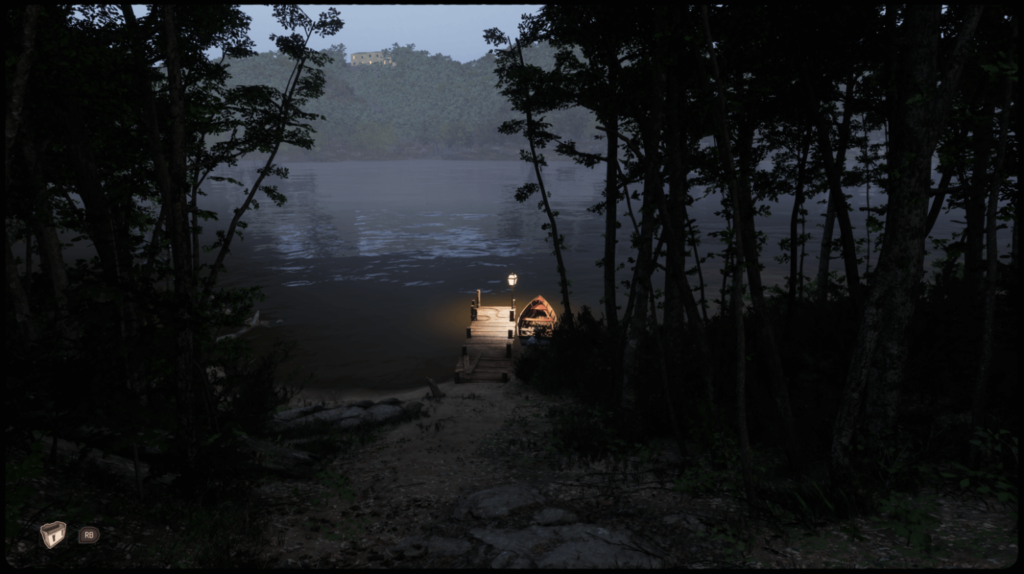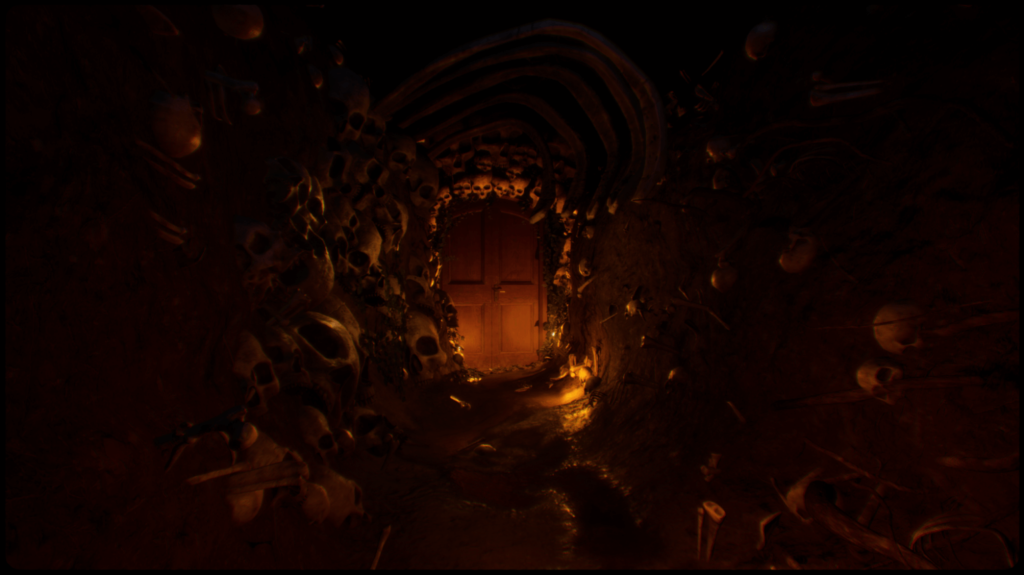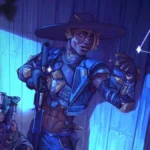Martha Is Dead presents itself as a psychological thriller that promises to explore a mixture of real locations, World War II, superstitions, folklore, and psychological trauma. Created by the studio LKA ( Tower of Light ), the game aims to tell a story full of macabre contours highlighted by realistic graphics.
The game fell even in the mouths of the people after the controversy of the censorship of several scenes in the Playstation, where scenes considered stronger were removed or altered. I played on Xbox Series X, so I soon learned the author’s complete vision for his game. Early on, we are warned that it could be considered visually disturbing and could cause discomfort with scenes that address psychological trauma, self-mutilation, dismemberment, disfigurement of human bodies, and abortion. These are strong themes, but they need the right approach to not just be mere additions to shock the player but to bring meaning to the proposed plot. Did Martha is Dead manage to bring the immersion of a psychological thriller, or does it just clash with grotesque scenes? Check it out in our review.
Set in WWII Italy, you play Giulia, the teenage daughter of German general hiding in the remote countryside. When your identical twin sister, Martha, is murdered, it’s up to you to figure out what happened while posing as her. Pretending to be Martha allows you to investigate at the cost of disturbing visions freely. Well, until she doesn’t do it for long periods. Despite a great premise, Martha Is Dead is very unfocused. Calling it a horror game is generous since it turns into a PBS drama halfway through.

There is no core game cycle; at best, it’s a walking simulator with QTEs and nasty minigames. Inconsistent pacing doesn’t help with this. You’ll never know which missions will suddenly drag the plot forward, with almost no signposts to guide you.
Martha is died Gameplay story
Martha Is Dead is set in 1944 Italy, during the events of World War II. Amidst all this, a woman’s body is found drowned by young Giulia, who despairs of discovering that it is her twin sister Martha. He goes into shock and is found by her parents, who instantly believe that she is Martha and that Giulia’s daughter died. There the mystery surrounds us. Why did parents not correctly identify their daughters? What is the reason for murdering Martha? And Giulia, why did you let the farce go on?
Gradually we discover the complicated dynamics between the family. Giulia never received love from her mother, who considered her the family’s black sheep but gave all her love to her daughter Martha. Her father, a German general, seemed to have a lot of affection for both daughters but a greater identification with Giulia.
In the beginning, we see Giulia wearing Martha‘s face, with the controversial scene where she removes her sister’s face and dresses it as her new identity. Everything up to this point was well connected with the narrative, creating curiosity, a sense of fear, and the unpredictability of what might come next. Unfortunately, that feeling never happened again.
The premise of bringing tension while tackling psychological trauma, and Giulia‘s troubled mind, works well in the first few minutes of the intro, but that quickly fades, with long moments in which nothing relevant happens and we’re just interacting with objects that reveal very little about the plot. Suddenly we are transported to Giulia‘s nightmares to experience some shocking scene, which brings nothing significant, as the studio failed to create the immersion that took us to that moment.
Except for a good chase sequence in the forest, Martha is Dead boils down to walking without anything significant happening to create a connection with the protagonist’s story and the other characters, to be thrown into grotesque scenes that don’t bring too much depth for anything, and which seem to be there to shock.

The weight of war never comes, even though the family is somehow involved in the conflict. Everything is treated superficially, and the horrors of war are never treated satisfactorily.
The premise of tackling a supernatural dynamic between two twin sisters amid a mysterious murder and still having WWII seemed very promising. Still, Martha is Dead never delves deep into its psychological themes or creates a sense of tension in the film. Player. It focused on shocking scenes that made everything else an empty experience.
A mix of good ideas and disposable moments
In Martha is Dead, we walk and interact with objects either to advance the narrative or to know a little more about Giulia‘s family and some people who have a connection with them and the events of the War. We stroll, and we can run, but it’s just a less slow way to get around, as it’s also prolonged, but it’s also not very different from many other games of this style, which opt for this slower movement to create tension and a more cinematic experience.
An excellent differential in this popular recipe is the protagonist’s camera. Some models change her look, but what shines are the various accessories we find for her, such as filters, lenses, tripod, flash. The minigame to take the photos is also interesting, with several rules that we need to follow to take the photo correctly. Some of these images are linked to the story, others are not, and some even hide messages for Giulia, which can only be captured with the right accessories. There is still a dark room for the revelation of these images, which also adds a minigame, which is simple but brings a good immersion.
There are still segments during Giulia‘s dreams in which she runs to form sentences that reveal how she feels. We need to choose the right words to advance through the dream. The setting and trail of these scenarios are attractive.
However, the worst thing they could have added to the game is the overly long sequences with puppet theater, which are unfortunately not optional. The idea is even interesting, with the idea of the protagonist releasing repressed memories, but everything is applied tediously, and I want to finish soon.
Shooting spirits
Photography is an exciting mechanic that the game could have leaned on more. Think Life Is Strange but with slaughtered pigs and haunted graves. Certain items you stumble across in the world are marked with a subtle little camera icon, and photographing them will reveal more stories, but you can take pictures of anything you want. The game also scatters new lenses and movies to find, more than the game’s objectives require, and I often found myself experimenting and cataloging things in the environment just because I liked it. I didn’t even mind that each photo had to be developed in the darkroom with a short sequence of framing, exposure, and chemical dipping that was repetitive but satisfying.
The horror gets creepier as you progress through the game, like a decomposing body. Sinister vibes turn to brutal violence, questionable mental health turns to rage psychosis, and something terrible happens to a dachshund. I can see why PlayStation censored it; the only platform that does, you’ll get the whole experience on Xbox and PC because few sentient beings won’t find at least one part of the game alarming. The developer even bundles the game with activation warnings and links to a mental health charity. The ending scenes have their particular option to play a version censored by the developer himself.
Shocks and locks
There’s a lot in Martha Is Dead’s ideas for the horror fan to love: female body horror presented in a non-exploitative way, creepy puppets, truly shocking sets, but it’s all caged in by a game that feels like an afterthought. There’s that ‘too slow to be fun going back and forth between the same places to do this or that menial task. You get a bike early on, but riding it is worse than walking, and there are some old sins like finding a couple of bolt cutters but not being able to pick them up until you shuffle to the door, which, surprise surprise, is locked. Padlock. Likewise, an initially effective way of showing past events, a creepy puppet show, drags on too long, like an idea that she was so in love with herself that she didn’t know when to end the show.
Nice graphics
The development of the environments, exploring the Tuscany region during World War II, is well done, with many details in each scenario. The care is taken in adding newspaper clippings or the radio showing how the world was doing during the war also helps to place us within that historical moment. Applying light and shadow effects works well. When it’s dark, it’s dark, and we need to use points of light to our advantage. Unreal Engine 4 does its job well and has helped LKA show the authentic setting of their game in great detail.
On Xbox Series X, which is the version I played, the game runs at 4K resolution at 30FPS or 1080p at 60FPS. Both modes work well; it’s up to you which one suits your style best. On Xbox Series S, it only runs at 1080p and 30FPS. In the settings, there is only the choice of resolution, the framerate information, strangely, is omitted.
The soundtrack adds good moments, with some tracks well inserted to generate awkwardness and others to give a reasonable tone of tension. I just missed more ambient sounds, which brought that feeling of constant fear.
Opinion
Martha is Dead has good ideas and a plot with an absurd potential to be explored, but my feeling, after finishing it, with a little more than 6 hours of gameplay, is that everything was poorly explored. There are uncomfortable and robust scenes, but none of this has any real impact on the plot as a whole, as there is no growing creation of expectation until that moment is reached. It felt like a gratuitous attempt to shock rather than add depth to the plot they were trying to tell.
I couldn’t feel empathy for the characters or their personal and psychological problems, nor could I even feel a real sense of fear, which is sad for a game of this genre. It doesn’t captivate with its narrative and generates rare moments of tension, focusing too much on just getting too intense scenes, but that doesn’t add anything for the game to have something that connects us with what we see on screen. It might be worth knowing if you like the genre and like to expand your knowledge of this type of game, but only at an excellent promotion.





